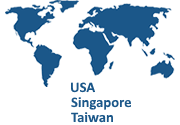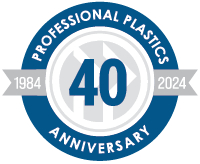-
![Replacing Metal With Plastics Replacing Metal With Plastics]()
Replacing Metal With Plastics
Why Designers Continue To Replace Metal Parts With Engineering Plastics
Mechanical engineers and designers are increasingly replacing existing metals parts with components made from engineering plastics. A common misconception is that this trend is based purely on reducing the initial cost per part, but the reality is quite different. Engineering plastics are often more expensive than metals, but provide benefits such as improved performance, longer part life, and reduced downtime. This long-term, "overall cost of ownership" approach is driving a strong market for engineered plastic solutions.
Here are a few of the product features and benefits that are driving the trend towards increased use of engineering plastics.
Wear Resistance
In high-wear applications, many plastic materials will outperform brass & other metal bearing materials. Plastics such as Nylon, UHMW, PTFE, Acetal and Turcite® offer natural lubricity to increase wear resistance and extend the part life of bearings, rollers, gears, and seals.
Lightweight
When replacing metal parts, plastics will typically reduce the part weight by 30% to 50%.This can translate to significant energy savings when used in applications such as transportation, linear motion, and material handling.
Temperature Resistance
Plastics, ceramics, and composites have been developed which resist both extremely high & extremely low cryogenic temperature ranges with minimal loss of mechanical properties. Materials such as Celazole® PBI can continually operate at up to 750°F, while materials such as Kel-F® PCTFE can operate at -400°F.
Impact Resistance & Shock Absorption
Many plastics and composites offer excellent impact resistance. Materials such as Polycarbonate are used for impact-resistant glazing and shields. Nylon, UHMW and Polyurethane will absorb impact shock and isolate stress points to protect surrounding components.
Insulation Properties
Many plastics have excellent insulation properties, reducing heat, and improving product reliability. Laminates such as G-10/FR-4, GPO-3 and LE Phenolic are used extensively in electrical and transportation industries to insulate from heat and electrical shock. Thermoplastics such as PTFE and Meldin® work well in high-temperature insulating applications.
Corrosion Resistance
Metals are inherently susceptible to corrosion from moisture, acids, and organic solvents. Many plastics were designed specifically to combat these problems. Materials such as PVC, CPVC, Polypropylene, and PTFE offer superior corrosion resistance at an economical price.
Medical Approval
Many plastics have been approved for use in medical applications ranging from heart pump valves to endoscopic instruments. Products meet FDA, USP Class VI, and ISO 10993 standards. Such materials include Radel®, PEEK, Ultem®, and Polycarbonate.
Fire Safe
Dozens of plastic materials have been developed to meet common aircraft, transportation, semiconductor, and UL ratings for flame and smoke safety. Specifications include FAR, FTA, FRA, ASTM, UL and FM. In the semiconductor industry materials meeting the FM-4910 specification have reduced or eliminated the need for costly fire-suppression systems, and thus have reduced overall equipment costs. In some cases, the use of these materials have even reduced insurance costs in high-liability applications. Common flame-retardant and flame-safe materials include: Kydex®, Boltaron®, Halar®, CP7-D, FRPP, Corzan® CPVC, and Kynar® 740 PVDF.
High Purity
Plastics have long been a crucial product used in the manufacturing of high-purity fluid & gas handling applications. Many plastics have eliminated the concerns of out-gassing, leaching, and other contamination in crucial high-purity systems. These products include: PTFE, PFA, FEP, Halar® and Kynar® PVDF.
Static Control
Several plastics and composites have anti-static qualities to prevent the build up of an electric charge. Products range from conductive materials 102 to 106, and static dissipative 106 to 1010, to highly resistive materials 1010 to 1012.
-
Rexolite®
Rexolite® is a unique cross linked polystyrene microwave plastic. Rexolite® is often used for high-frequency circuit substrates, microwave components, and lenses with acoustic, optical and radio-frequency applications. REXOLITE 1422 is a thermoset cross-linked styrene copolymer. Combination of good physical and excellent electrical properties including low loss and stable dielectric constant makes this material suitable for use in microwave lenses as well as for precision components.
- Note: Rexolite 1422 meets requirements of L-P-516A (Type E2) formerly MIL-P-77 (Type E-2)
TYPICAL REXOLITE APPLICATIONS:
• microwave lenses • microwave circuitry • antennae • coaxial cable connectors • sound transducers • TV satellite dishes • sonar lenses • nondestructive material testing devices • surveillance equipment • radar windows • radomes • missile guidance system housings
-
Rulon® 123
Rulon® 123 is a glossy black non-abrasive compound for softer mating surfaces, such as stainless steel. This material has excellent chemical resistance and is FDA, USDA, and NSF compliant.
Rulon® 123 has a high resistance to deformation, low coefficient of friction, as well as good thermal and electrostatic dissipation. This material has a maximum operating temperature of 550 °F (300°C).
It is less expensive than Rulon J, but is slightly less flexible and higher in wear.
Rulon 123 releases black wear debris over time and should not be used in ultra-dry vacuum applications or where electrical insulation is desired.
- More Bearing & Wear-Resistant Materials
-
Rulon® 1337
Rulon® 1337 Tan FDA compliant material with low frictional characteristics and excellent chemical resistance for most mating surfaces.
Rulon® 1337 is a tan material made entirely from FDA compliant components. It has excellent physical properties and is chemically compatible with most chemicals, except concentrated sulfuric acid. This offers much flexibility in wash-down environments of food and pharmaceutical processing environments.
It has a slightly lower coefficient of friction than Rulon J, offering extended life and less abrasion with softer mating surfaces.
It is compatible with most commercially available natural lubricants for additional reduction in friction.
-
Rulon® 142
Rulon® 142 is a specially formulated, dull blue-green linear bearing material. It exhibits low wear, high thermal dissipation, and good dimensional stability characteristics.
Rulon® 142 has excellent mechanical properties and is the ideal material for machine tool applications. Its low deformation characteristics limit the amount of misalignment that can occur with other bearing materials.
- Strong acids and bases should be avoided, as they may attack the fillers.
- More Bearing & Wear-Resistant Materials
-
Rulon® 488
Rulon® 488 is a dull turquoise material originally developed for use with painted surfaces. It has been used in veneer dryer bearings in the plywood industry.
Its excellent wear resistance, especially in extremely dry environments, make it a material of choice in hydrogen and natural gas compressors. Its almost universal chemical resistance enables it to withstand corrosives and acids sometimes present in trace amounts in these environments.
- Rulon 488 has a higher load capacity than Rulon® J and better abrasion resistance than both Rulon® J and Rulon® 123.
-
Rulon® 641
Rulon® 641 is manufactured from FDA compliant materials which possess excellent load and wear characteristics.
It offers excellent, continuous non-lubricated service up to 10,000 PV - higher for intermittent service. While the load capacity of Rulon 641 is generally limited to 1,000 psi at room temperature, deformation is a function of wall thickness, temperature, and load.
Its compatibility with a wide array of mating surfaces, including mild steel, 303 and 316 stainless steels, as well as harder materials, make it a good choice for most food and pharmaceutical bearing applications.
- More Bearing & Wear-Resistant Materials
-
Rulon® 945
Rulon® 945 is a black PTFE-based material that has very low wear and deformation under load, making it ideally suited for demanding thermal applications.
Deformation is the lowest of all Rulon® grades. It also possesses excellent chemical resistance and good dimensional stability.
Rulon® 945 is best suited for use against hard mating surfaces, like hardened steel substrates since it does have moderate abrasive qualities. Not suitable in applications where electrically insulating properties are required.
- More Bearing & Wear-Resistant Materials
-
Rulon® 957
Rulon® 957 Green is a speckled material, excellent bearing grade with noise dampening capability
Rulon® 957 is a speckled green material that was developed specifically for noise dampening and abrasion resistance, such as in commercial or residential clothes dryers.
It provides low friction operation on softer mating surfaces at higher loads than Rulon® J.
This material also offers excellent performance on coated metals, particularly porcelain. Among its many benefits are an overall reduction of the weight of the finished product, vibration absorption, and cost reduction due to rapid manufacturing methods.
Applications:
- Clothes Dryers, Commercial Dryers, Ovens, Automotive, Mixers, Insulators, Sanders, Linear Slides, Wear Bands, and Compressors
- More Bearing & Wear-Resistant Materials
-
Rulon® F
Rulon® F is a green material with excellent insulating properties and superior abrasion resistance.
It is used in a wide variety of wear component and bearing applications, and is currently used as the liner in one of our composite journal bearings (Rulon® FCJ).
Rulon® F exhibits excellent wear resistance, especially in dry conditions. This material suitably slides against a wide range of mating surfaces but is NOT recommended for contact with strong bases or steam.
- More Bearing & Wear-Resistant Materials
-
Rulon® J (Gold)
Rulon® J is an all-polymeric reinforced, dull gold colored PTFE compound that operates exceptionally well against soft mating surfaces such as 316 stainless steel, aluminum, mild steel, brass and other plastics. The unique "shaft friendly" material is also low in friction and wear and is self lubricating.
Rulon® J has one of the lowest coefficients of friction of most reinforced PTFE materials. This makes it ideally suited for start/stop applications where stick-slip must be eliminated. The tribological properties of this material also make it suitable for both bearing and wear component applications.
-
Rulon® LR (Maroon)
Rulon® LR is a maroon colored bearing material best known for its versatile design properties. Rulon LR is compatible with most hardened steel substrates. Mild steel is acceptable; harder running surfaces are better. Rulon® has a practically universal chemical inertness. Of the chemicals encountered in commercial practice, only molten sodium and fluorine, at elevated temperatures and pressures, show any signs of attack.
- More Bearing & Wear-Resistant Materials
-
Rulon® W2
Rulon® W2 is a black PTFE-based material developed for use in fresh-water applications.
Rulon® W2 exhibits low friction and excellent wear characteristics (one of the lowest wear rates in fresh water) as well as good thermal dissipation, preventing shaft distress. Its properties are enhanced when wet.
Rulon® W2 is compatible with most metal substrates and soft mating surfaces.
- More Bearing & Wear-Resistant Materials
-
Rulon® AR
Rulon® AR is somewhat more flexible than Rulon® LR, hence suitable for seals and bonded coating of slide surfaces. It has many decades of use in automotive shaft seals and fuel metering pump cups.
Rulon AR has a practically universal chemical inertness like that of Rulon LR and provides long life and reliability in continuous non-lubricated service. It is capable of operating at PV values up to approximately 10,000. Higher PV values are possible for intermittent use applications.
Performance Range:
- Max Load "P" MPa: 6.9 / 1,000 PSI
- Max Speed "V" m/s: 2.0 / 400 fpm
- Max "PV" MPa • m/s: 0.35 / 10,000 PSI-fpm
- More Bearing & Wear-Resistant Materials
-
Ryton® - PPS - 40% Glass-Filled
Ryton polyphenylene sulfide (PPS) has a long standing reputation as a high performance engineering thermoplastic. With an exceptional degree of inherent thermal stability, dimensional stability, chemical resistance, and flame resistance, combined with excellent mechanical and electrical properties, Ryton PPS can provide superior performance over a broad range of critical design requirements. Ryton also possesses excellent processing characteristics necessary to meet demanding, high precision applications.
-
Seelye® Plastic Welder Overview
Seelye offers a full line of hot air/gas welders, distributed by Professional Plastics.
Models:
- 270-11005 - Model 63 Series
- 270-11002 - Model 63 Series
- 270-11167 - Model 63 Series
- 270-2001FC - 2001 FC Series
- 270-2001FCP - 2001 FCP Series
- 960-11197CH - 1197CH
Welder Elements:
Item # - Element - Shipping Weight - To Be Used For
- 270-11060 400 W 120 V 0.5 lb 2001FC & 2001FCP
Model 63
- 270-11061 500 W 120 V 0.5 lb 2001FC & 2001FCP
Model 63
- 270-11062 650 W 120 V 0.5 lb 2001FC & 2001FCP
Model 63
- 270-11074 500 W 240 V 0.5 lb Model 63
- 270-11078 800 W 120 V 0.5 lb 97CH Welder
-
-
-
Seeyle Welder Elements
Welder Elements:
Item # - Element - Shipping Weight - To Be Used For
- 270-11060 400 W 120 V 0.5 lb 2001FC & 2001FCP
Model 63
- 270-11061 500 W 120 V 0.5 lb 2001FC & 2001FCP
Model 63
- 270-11062 650 W 120 V 0.5 lb 2001FC & 2001FCP
Model 63
- 270-11074 500 W 240 V 0.5 lb Model 63
- 270-11078 800 W 120 V 0.5 lb 97CH Welder
-
|








